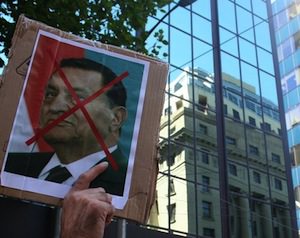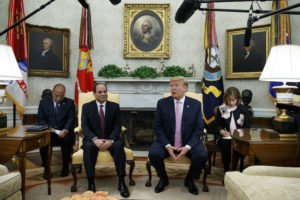Egypt Jails Secular Leaders of 2011 Revolt
Three leaders of Egypt's 2011 uprising were put in prison for what could be three years in a government effort to stamp out secular and Islamist opposition to the current administration, activists say.
Three leaders of Egypt’s 2011 uprising were put in prison for what could be three years in a government effort to stamp out secular and Islamist opposition to the current administration, activists say.
Ahmed Maher, Ahmed Douma and Mohamed Adel were senior members of the youth movement that stirred opposition to the Mubarak government in the years leading up to the uprising. In addition to receiving jail time, the three were fined for disobeying laws curtailing the right to protest and assaulting a police officer. The men were also targeted under the presidency of Mohamed Morsi, the democratically elected leader who was deposed this year.
“The repression happening now to the movement and to other NGOs [nongovernmental organizations] is even higher than what we experienced in [Hosni] Mubarak’s time,” said Amr Ali — Maher’s successor as leader of the youth movement, just before the sentence was rolled out. “Mubarak’s regime is trying to get power back, and there is a systematic approach of revenge against groups and movements that stood against it.”
“Whoever’s ruling now is more or less depending on a policy of fear — under the name of fighting terrorism and fighting the Islamists.”
The Guardian reports:
For many campaigners, the imprisonment of the three activists highlights the extent of the Egyptian police’s resurgence. Police brutality was a major cause of the 2011 uprising, and its continuation under Morsi contributed both to his downfall and to the institution’s loss of prestige. But the interior ministry – which runs the police – returned to popularity by backing Morsi’s deposition, and appears to believe it has a mandate to crush any kind of dissent, say observers.
“There’s nothing new about the police behaving this way, and there’s nothing new about them going after activists,” said Heba Morayef, Egypt director at Human Rights Watch. “But for me what is significant, and what makes this so ominous, is the sense of entitlement the ministry of interior now has. They’re going after the figureheads of the 2011 revolution, and they’re trying to erase the gains made since January 2011.”
But while the trio’s sentencing has enraged Egypt’s revolutionaries, it is unclear how much the move will effect the Egyptian street. Maher told the Guardian in November that people were beginning to realise the oppressive nature of Morsi’s successors. But he also admitted that many ordinary Egyptians – exhausted by the economic chaos and violence that followed Mubarak’s overthrow – were tired of the revolution and were now willing to trade freedom for a government that could bring them political and economic stability.
— Posted by Alexander Reed Kelly.
Your support matters…Independent journalism is under threat and overshadowed by heavily funded mainstream media.
You can help level the playing field. Become a member.
Your tax-deductible contribution keeps us digging beneath the headlines to give you thought-provoking, investigative reporting and analysis that unearths what's really happening- without compromise.
Give today to support our courageous, independent journalists.






You need to be a supporter to comment.
There are currently no responses to this article.
Be the first to respond.